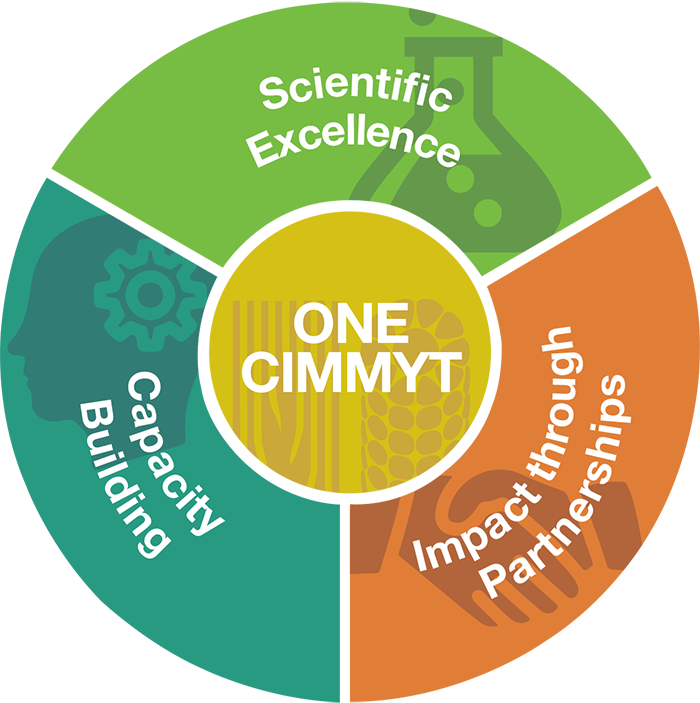Year: 2016
Conference highlights urgent need to harness genetic resources for future food security
 Innovations
Innovations
The International Agrobiodiversity Congress provides a platform for farmers, scientists, policymakers and industry leaders to share their experiences in agrobiodiversity management and genetic resource conservation.
National maize stem borer mass rearing laboratory inaugurated in Pakistan
 Nutrition, health and food security
Nutrition, health and food security
CIMMYT inaugurated the first national maize stem borer mass rearing laboratory at the National Agricultural Research Center in Islamabad on 25 October 2016.
World Food Prize presentation updates delegates on key contributions of MasAgro
 Capacity development
Capacity development
Transforming subsistence agriculture and unsustainable farming systems into productive and sustainable operations has been the key focus of scientist Bram Govaerts, 2014 recipient of the Norman Borlaug Award for Field Research and Application.
New Publications: How to better breed maize for future climates in Latin America
 Climate adaptation and mitigation
Climate adaptation and mitigation
New study reveals findings to help increase drought and heat tolerance in Latin American maize.
Growing more with less: Improving productivity, resilience and sustainability in Africa
 Climate adaptation and mitigation
Climate adaptation and mitigation
Sustainable intensification is helping farmers in Sub-Saharan Africa become more productive, while adapting to and mitigating climate change.
Strategizing for the future: adapting to a changing agricultural landscape
 Capacity development
Capacity development
Forging major change is never simple, but one of my top priorities upon taking the helm at CIMMYT as director general last year was to develop a new five-year institutional strategy.
Gazing into the crystal ball at the future of food: Nutrient-dense maize and wheat
 Nutrition, health and food security
Nutrition, health and food security
Diversity is important for finding traits that will allow maize and wheat to be more nutritious than they are already today and so aid in meeting the demands of the future, writes Gideon Kruseman, CIMMYT ex-ante and foresight specialist
Changing the conversation surrounding food and agriculture with Tamar Haspel
 Nutrition, health and food security
Nutrition, health and food security
Tamar Haspel delivered a keynote address at a three-day conference hosted by CIMMYT to celebrate the nonprofit’s 50th anniversary.
Weeding out the losses: Striga challenges in Kenya
 Capacity development
Capacity development
The Striga weed is one of the leading causes of crop loss in western Kenya, a significant dent to farmers’ livelihoods and major hindrance to food security in the area.
Empowering women to eliminate residue burning for better human and soil health
 Gender equality, youth and social inclusion
Gender equality, youth and social inclusion
A leading NGO is working together with CIMMYT in India to generate awareness among women about climate-smart practices.
Tackle food insecurity with homegrown education, Food Prize delegates say
 Capacity development
Capacity development
Africa must develop a strong educational infrastructure to address the challenges of poverty, malnutrition and food insecurity, said experts at the World Food Prize.
Biofortification to fight “hidden hunger” in Zimbabwe
 Nutrition, health and food security
Nutrition, health and food security
The goal of completely eradicating vitamin A deficiency – mainly in Africa and Southeast Asia – remains a big challenge.
New Publications: New findings on effects of tillage on growth, yield and more
A study from CIMMYT scientists has revealed new insights on the respective benefits of conventional tillage (CT) and zero tillage (ZT) in north-west India.
Wheat training foundation offers hope to end rural poverty
 Capacity development
Capacity development
In her youth, Tunisian Manel Othmeni developed an interest in interacting with plants, a fascination that later grew into a passion for wheat research.
Private sector seed distribution vital for food security, World Food Prize delegates say
 Innovations
Innovations
Public-private collaborations can deliver improved seeds to smallholder farmers faster, speeding up global efforts to meet food security targets.
